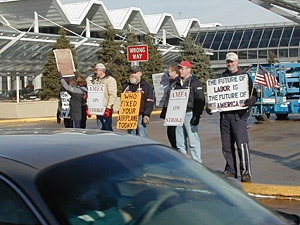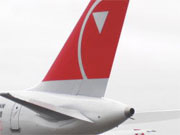Photos
| ||||||||||||||||||||||
 |
| Picket lines like this one at Minneapolis-St. Paul International Airport could end today if striking mechanics approve a settlement with the airline. (MPR File Photo) |
St. Paul, Minn. — The strike that began August 19th could end quietly today if a majority of mechanics approve the settlement and labor contract that goes with it. Most of the 4,400 mechanics, cleaners and custodians who struck have no job to return to. Their work has been outsourced to other companies or their job filled by one of 880 replacement workers -- including a reported 480 striking or laid off Northwest mechanics who crossed the picket line.
If the settlement is ratified, strikers will receive four weeks of severance pay, based upon the lower wage rates paid to those replacements. They'll be paid for accrued vacation time, and have the right to collect unemployment benefits if they have not yet found other work. If jobs open up in the future at Northwest, they'll be first in line.
Experts predict a close vote. Consider two Twin Cities mechanics: Pat Gang and George Hellmer. Both have worked at Northwest for about 20 years. Both let their picket line duty slip as the strike ticked on, and found other jobs relatively quickly. Neither has any desire to return to Northwest.
For Gang, it's time to take the severance pay and leave the strike behind. "I mean no disrespect to my former workmates," he says. "But everybody I associate with socially or talk to has voted 'yes.' They just want to move on. There's no point to be made here any more. Get real dudes -- you can be replaced."
The other mechanic, George Hellmer, says of 15 mechanics he talks with, all but one rejected the settlement. Hellmer calls the severance package from Northwest "get-out-of-here money," and considers it insulting. "To me, four weeks' pay is too cheap a buyoff for what I went through. I gave them 20 years of the best I could give them, commuted two years from Detroit, and the best they can do is four weeks and no hope of any future? Wasn't enough for me to accept."
Macalaster College labor historian Peter Rachleff, a supporter of the union, says many members are conflicted. "They want to be pragmatists, they want to come out of this with something," he says. "But at the same time, they see themselves within history: that they took a stand that was very important, and they don't want to throw that away."
The strikers are voting not only on a settlement for themselves, but also to affirm or reject what is essentially a contract for their replacements. That contract will have no effect on most strikers. Still, Aircraft Mechanics Fraternal Association national director O.V. Delle Femine wants members to vote no, continue striking, and turn down the contract.
Delle Femine calls it "by far the worst contract in the history of airline labor." It contains the same terms Northwest imposed upon the current replacement workers. The pay is lower, there's more outsourcing, and union membership is only optional. Historian Peter Rachleff says other labor groups and companies are watching, including the seven other airlines where AMFA represents mechanics. And he says Northwest's striking mechanics know it.
"Their feeling is, if they were to accept the language of this contract and its terms, they would be establishing a counter-productive precedent for both other workers at Northwest and at other airlines," Rachleff says.
For the 880 replacement mechanics at Northwest, the vote has little practical impact. According to the contract, their terms of employment would not change until at least 4 years after Northwest leaves bankruptcy.
Northwest has said only that a settlement with the strikers would allow both sides to move forward.
Doug McKeen is a former vice president of labor relations for Northwest, and now an airline industry consultant. "I think Northwest recognizes that the best thing for them to do from a public relations perspective and an employee-relations perspective -- recognizing that some of these employees will be coming back as vacancies come available for the company -- is to get this behind them and let the employees have a voice in saying that they want this agreement," McKeen says.
Voting on the settlement has been electronic. So Northwest and its mechanics should know shortly after the 9:00 a.m. deadline whether the strike ends at 133 days -- or the counting continues.




